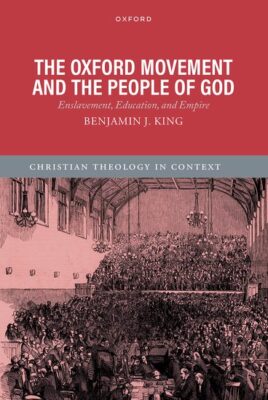The Rev. Benjamin King, Ph.D., Interim Academic Dean, Dean of the Chapel, and Duncalf-Villavoso Professor of Church History at Seminary of the Southwest, recently announced the publication of his new book. The Oxford Movement and the People of God was published by Oxford University Press in January. You can find more information and purchase the book here.
 “This book has taken me over ten years to research and write. I started writing it because I was fed up with folks saying that the Oxford Movement was all about the clergy and had nothing to say about lay people,” King said. “In fact, the laity were involved from the Movement’s inception and the Episcopal Church’s inclusion of the laity provided them with a stimulus. So this book is about nineteenth-century America, too. I also wanted to put the Oxford Movement in the context of the British Empire and the American Civil War. The book is expensive because it’s only available in hardback, but as someone told me it’s worth every penny because ‘wisdom has no price’!”
“This book has taken me over ten years to research and write. I started writing it because I was fed up with folks saying that the Oxford Movement was all about the clergy and had nothing to say about lay people,” King said. “In fact, the laity were involved from the Movement’s inception and the Episcopal Church’s inclusion of the laity provided them with a stimulus. So this book is about nineteenth-century America, too. I also wanted to put the Oxford Movement in the context of the British Empire and the American Civil War. The book is expensive because it’s only available in hardback, but as someone told me it’s worth every penny because ‘wisdom has no price’!”
“The Rev. Dr. Ben King, as a leading scholar of the Oxford Movement, has produced just the book we need,” said Dr. Scott Bader-Saye, dean and president. “At a moment when we are recognizing the importance of lay leadership for church vitality, Ben displays for us the deep affirmation of the mission of the laity in the Tractarian tradition. He does this while exploring hard topics of our moment, including enslavement and empire. This book is an exceptional work of scholarship in service of helping all of God’s people better live out our calling.”
About The Oxford Movement and the People of God:
Seeing the Church in danger from the government in 1833, the clergyman John Henry Newman wanted to ‘look to the people’ for help. The people of God were vital to the Tractarian (or Oxford) Movement which Newman, John Keble, and Edward Pusey led, and which hundreds of thousands of Anglican laypeople followed during the nineteenth century. The faithful were central to the movement’s theological vision. Spiritually disciplined, the faithful would ensure that the Church’s work in the world was ongoing. Properly educated, in schools for the middle classes and for the poor, at home and across the British Empire, the faithful would preserve the Church’s teaching.
Yet to opponents in the nineteenth century, and most scholars since, the movement seemed to magnify the role of the clergy of the Church of England at the expense of the people. This is to neglect not only Tractarian theology, but also lay Tractarians themselves, whether the few who were important figures in the British nation and Empire, or the many who took part in shaping society.
The Oxford Movement and the People of God covers topics which are not usually encountered in studies of the Tractarians-enslavement, Empire, and English engagement in the American Civil War-as well as showing how their theology of the laity sheds new light on old topics-the Church of England’s privileged place in the State, the Ritualist movement, and opposition to democracy. In none of these topics was the movement on what is called, with hindsight, ‘the right side of history’. But the theological reasons, such as they were, why Tractarians took the positions they did are explored in chapters concerning providence, ecclesiology, consensus fidelium, episcopacy, and lay spirituality.

